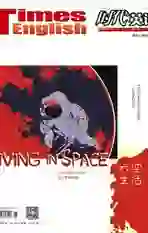Unit 7 Will people have robots?
2019-11-07

重点单词
1. paper n. 纸;纸张
paper表示“纸;纸张”时,是不可数名词。
a piece of paper 一张纸
(1)paper可作定语,如:paper money纸币。
(2)paper意为“试卷;论文”时,是可数名词。
Please hand out the papers.
请分发试卷。
2. pollute v. 污染
Did it pollute the environment?
它对环境有污染吗?
pollution n. 污染;污染物
polluted adj. 被污染的
3. build v. 建筑;建造
搭配:
build sth for sb/build sb sth 为某人建造某物
They built a house for me. = They built me a house.
他们为我建了一所房子。
(1)build n. 体形;身材
a man of average build 中等身材的人
(2)building n. 建筑物;楼房
tall/old/historic buildings 高大/老/有历史意义的建筑物
4. dangerous adj. 有危险的;不安全的
It would be dangerous for you to stay here.
你待在这儿不安全。
danger n. 危险;风险
Doctors say she is now out of danger.
医生说她已脱离危险。
in danger/out of danger 处于危险中/脱离危险
5. believe v. 相信;认为有可能
I dont believe you!
我不相信你的话!
Police believe that the man may be armed.
警方认为那个人可能携带了武器。
believe it or not 信不信由你
believe in 信赖;信任
辨析:believe和believe in
believe表示“相信某人说的话是真的或相信某事会发生(或已经发生)”;believe in则表示“相信某人的人格(信任某人)”。
I believe in you, but I dont believe you this time.
我信任你,但这次我不信你说的。
6. agree v. 同意;赞成;应允
搭配:
agree with sb 同意某人的话、观点、想法等
agree on sth 就某事達成一致意见
agree to sth 同意提议、办法、计划等
agree to do sth 同意做某事
I really cant agree with you.
我实在不能同意你的观点。
They agreed on a date for the next meeting.
他们就下次会议的日期达成了一致意见。
Do you think he will agree to our plan?
你认为他会同意我们的计划吗?
She agreed to let me go early.
她同意让我早走。
agreement n. 协定;协议
disagree v. 不同意;持不同意见;有分歧
7. fall v. & n. 倒塌;跌倒;掉落
n.(美式)秋天
The house looked as if it was about to fall down.
房子看起来像要倒塌了。
I fell over and cut my knee.
我摔倒了,划破了膝盖。
He moved to New York in the fall of 2005.
2005年的秋天,他搬到了纽约。
fall behind 落后;落在……后面
fall down 突然倒下;跌倒;倒塌
8. possible adj. 可能存在或发生的;可能的
Ill do everything possible to help you.
我会尽一切可能帮助你。
as quickly/much/soon as possible 尽量快/多/早
possibly adv. 可能;或许
possibility n. 可能;可能性
impossible adj. 不可能存在或发生的;不可能的
9. side n. 一方(的意见、态度、立场)
We heard both sides of the argument.
我们听取了辩论双方的意见。
be on sbs side 站在某人一边;和某人观点一致
take sides 表示支持一方;表明立场
10. probably adv. 很可能;大概
Youre probably right.
你很可能是对的。
probable adj. 很可能发生(或存在)的
probability n. 可能性
重点短语
1. play a part 参与;发挥作用
Why not play a part in their discussion?
为什么不参与他们的讨论啊?
part n. 部分
We spent part of the time in the museum.
我们花了一部分时间在博物馆。
2. over and over again 多次;反复地
Ive told you over and over again not to do that.
我一再跟你讲不要那么做。
(all) over again 再;重新
3. hundreds of 许多;大量
The restaurant receives hundreds of customers every day.
这家饭店每天接待数以百计的顾客。
thousands of 数以千计的;成千上万的
注意:hundreds/thousands of不能与数词连用。当表示具体的“几百/千”时,用“基数词 + hundred/thousand”。
There are five hundred students on the playground.
操场上有500名学生。
4. look for 寻找;寻求
Are you still looking for a job?
你还在找工作吗?
辨析:look for和find
look for强调“寻找”的动作,表示“东西还没有找到,还在寻找当中”,可用于进行时态。find意为“找到;发现”,强调找的结果,不能用于进行时态。
look forward to sth/doing sth 盼望某事/做某事
活学活用
单项选择
1. Now the ____ is very serious. Some rivers and lakes are ____ .
A. pollution; pollution B. pollute; pollution
C. pollution; polluted D. pollute; polluted
2. Teachers shouldnt ask students to write the words ____ . Its simple and boring.
A. more again B. over and over again
C. again and over D. again over and over
3. There are ____ of students in our school but only ____ of them are girls.
A. hundreds; two hundred B. hundred; two hundreds
C. hundreds; two hundreds D. hundred; two hundred
4. He ____ come here tomorrow.
A. might B. maybe
C. probably D. may be
5. I think people here are friendly. Do you agree ____ me?
A. with B. to
C. on D. from
基本語法
一、一般将来时
1.概念
表示将要发生的动作或存在的状态,也表示将来经常或反复发生的动作。句中一般有以下时间状语:tomorrow,next day (week,month,year...),soon,the day after tomorrow 等。
2.基本结构
will/shall + do (shall只用于第一人称)
3.否定句
在will/shall后加not构成wont/shant。
I wont play tennis this afternoon.
今天下午我不會去打网球。
4.一般疑问句
will提到句首,some改为any,and改为or,第一、二人称互换。
We will go on an outing this weekend.
→Will you go on an outing this weekend?
5.对句中某一部分提问
一般将来时的情况下,对画线部分提问一般有三种情况。
(1)问人,用Who:
I will go to New York soon.
→Who will go to New York soon?
(2)问做什么,用What:
My father will watch a race with me this afternoon.
→What will your father do with you this afternoon?
(3)问什么时候,用When:
She will go to bed at nine.
→When will she go to bed?
6.be going to和will的区别
be going to 和will 虽然都表示将来发生的动作或情况,但它们的用法是有区别的。
(1)be going to主要用于:
① 表示事先经过考虑,安排好打算要做的事情。
What are you going to do today?
今天你们打算做什么?
② 表示根据目前某种迹象判断,某事非常有可能发生。
Look! There come the dark clouds. It is going to rain.
瞧!乌云密布,要下雨了。
(2)will主要用于:
① 表示单纯的未来“将要”,通用于各个人称。
They will go to visit the factory tomorrow.
明天他们将去工厂参观。
② 表示不以人的意志为转移的自然发展的未来的事。
Today is Saturday. Tomorrow will be Sunday.
今天是星期六,明天(将)是星期日。
③ 问对方是否愿意做某事或表示客气地邀请或命令。
Will you please turn on the radio?
请打开收音机好吗?
二、more,less和fewer
